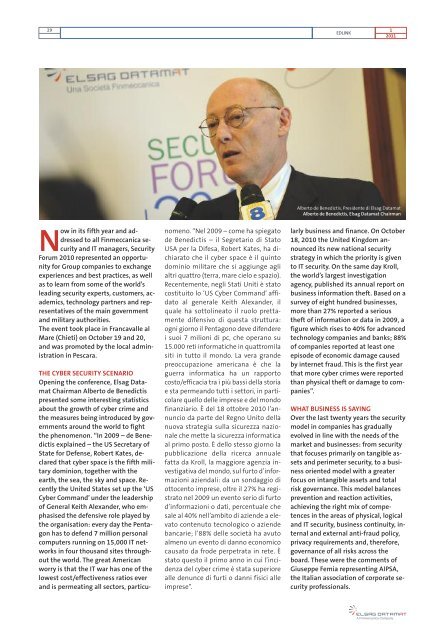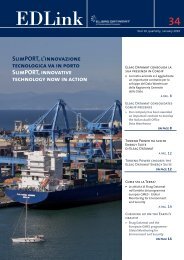ED Link n. 38 - Elsagdatamat.eu
ED Link n. 38 - Elsagdatamat.eu
ED Link n. 38 - Elsagdatamat.eu
You also want an ePaper? Increase the reach of your titles
YUMPU automatically turns print PDFs into web optimized ePapers that Google loves.
29<br />
Now in its fifth year and addressed<br />
to all Finmeccanica security<br />
and IT managers, Security<br />
Forum 2010 represented an opportunity<br />
for Group companies to exchange<br />
experiences and best practices, as well<br />
as to learn from some of the world’s<br />
leading security experts, customers, academics,<br />
technology partners and representatives<br />
of the main government<br />
and military authorities.<br />
The event took place in Francavalle al<br />
Mare (Chieti) on October 19 and 20,<br />
and was promoted by the local administration<br />
in Pescara.<br />
THE CYBER SECURITY SCENARIO<br />
Opening the conference, Elsag Datamat<br />
Chairman Alberto de Benedictis<br />
presented some interesting statistics<br />
about the growth of cyber crime and<br />
the measures being introduced by governments<br />
around the world to fight<br />
the phenomenon. “In 2009 – de Benedictis<br />
explained – the US Secretary of<br />
State for Defense, Robert Kates, declared<br />
that cyber space is the fifth military<br />
dominion, together with the<br />
earth, the sea, the sky and space. Recently<br />
the United States set up the ‘US<br />
Cyber Command’ under the leadership<br />
of General Keith Alexander, who emphasised<br />
the defensive role played by<br />
the organisation: every day the Pentagon<br />
has to defend 7 million personal<br />
computers running on 15,000 IT networks<br />
in four thousand sites throughout<br />
the world. The great American<br />
worry is that the IT war has one of the<br />
lowest cost/effectiveness ratios ever<br />
and is permeating all sectors, particu-<br />
nomeno. “Nel 2009 – come ha spiegato<br />
de Benedictis – il Segretario di Stato<br />
USA per la Difesa, Robert Kates, ha dichiarato<br />
che il cyber space è il quinto<br />
dominio militare che si aggiunge agli<br />
altri quattro (terra, mare cielo e spazio).<br />
Recentemente, negli Stati Uniti è stato<br />
costituito lo ‘US Cyber Command’ affidato<br />
al generale Keith Alexander, il<br />
quale ha sottolineato il ruolo prettamente<br />
difensivo di questa struttura:<br />
ogni giorno il Pentagono deve difendere<br />
i suoi 7 milioni di pc, che operano su<br />
15.000 reti informatiche in quattromila<br />
siti in tutto il mondo. La vera grande<br />
preoccupazione americana è che la<br />
guerra informatica ha un rapporto<br />
costo/efficacia tra i più bassi della storia<br />
e sta permeando tutti i settori, in particolare<br />
quello delle imprese e del mondo<br />
finanziario. È del 18 ottobre 2010 l’annuncio<br />
da parte del Regno Unito della<br />
nuova strategia sulla sicurezza nazionale<br />
che mette la sicurezza informatica<br />
al primo posto. È dello stesso giorno la<br />
pubblicazione della ricerca annuale<br />
fatta da Kroll, la maggiore agenzia investigativa<br />
del mondo, sul furto d’informazioni<br />
aziendali: da un sondaggio di<br />
ottocento imprese, oltre il 27% ha registrato<br />
nel 2009 un evento serio di furto<br />
d’informazioni o dati, percentuale che<br />
sale al 40% nell’ambito di aziende a elevato<br />
contenuto tecnologico o aziende<br />
bancarie; l’88% delle società ha avuto<br />
almeno un evento di danno economico<br />
causato da frode perpetrata in rete. È<br />
stato questo il primo anno in cui l’incidenza<br />
del cyber crime è stata superiore<br />
alle denunce di furti o danni fisici alle<br />
imprese”.<br />
<strong>ED</strong>LINK<br />
1<br />
2011<br />
Alberto de Benedictis, Presidente di Elsag Datamat<br />
Alberto de Benedictis, Elsag Datamat Chairman<br />
larly business and finance. On October<br />
18, 2010 the United Kingdom announced<br />
its new national security<br />
strategy in which the priority is given<br />
to IT security. On the same day Kroll,<br />
the world’s largest investigation<br />
agency, published its annual report on<br />
business information theft. Based on a<br />
survey of eight hundred businesses,<br />
more than 27% reported a serious<br />
theft of information or data in 2009, a<br />
figure which rises to 40% for advanced<br />
technology companies and banks; 88%<br />
of companies reported at least one<br />
episode of economic damage caused<br />
by internet fraud. This is the first year<br />
that more cyber crimes were reported<br />
than physical theft or damage to companies”.<br />
WHAT BUSINESS IS SAYING<br />
Over the last twenty years the security<br />
model in companies has gradually<br />
evolved in line with the needs of the<br />
market and businesses: from security<br />
that focuses primarily on tangible assets<br />
and perimeter security, to a business<br />
oriented model with a greater<br />
focus on intangible assets and total<br />
risk governance. This model balances<br />
prevention and reaction activities,<br />
achieving the right mix of competences<br />
in the areas of physical, logical<br />
and IT security, business continuity, internal<br />
and external anti-fraud policy,<br />
privacy requirements and, therefore,<br />
governance of all risks across the<br />
board. These were the comments of<br />
Giuseppe Femia representing AIPSA,<br />
the Italian association of corporate security<br />
professionals.



